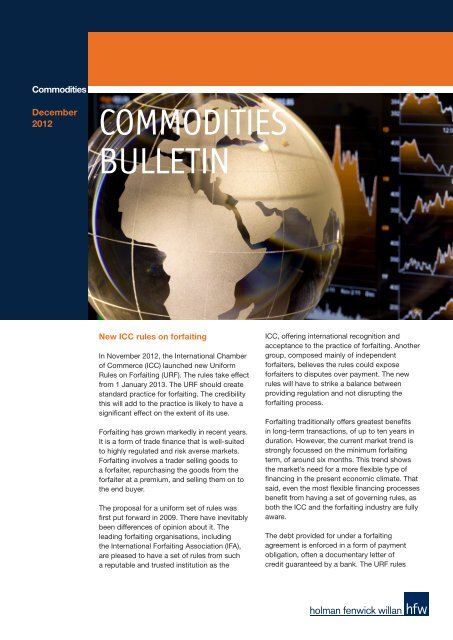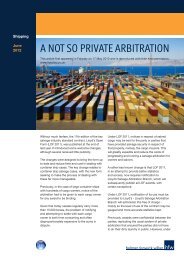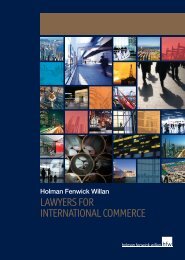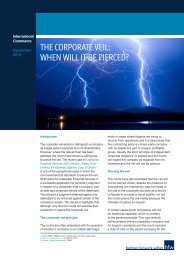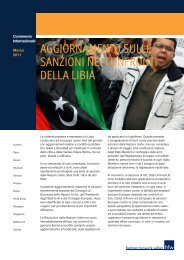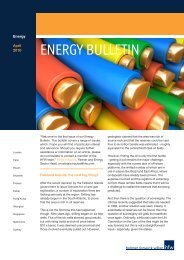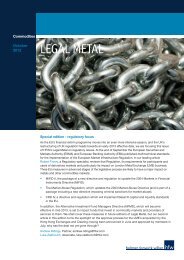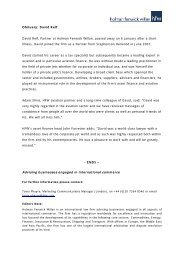Download file as PDF - HFW
Download file as PDF - HFW
Download file as PDF - HFW
Create successful ePaper yourself
Turn your PDF publications into a flip-book with our unique Google optimized e-Paper software.
CommoditiesDecember2012COMMODITIESBULLETINNew ICC rules on forfaitingIn November 2012, the International Chamberof Commerce (ICC) launched new UniformRules on Forfaiting (URF). The rules take effectfrom 1 January 2013. The URF should createstandard practice for forfaiting. The credibilitythis will add to the practice is likely to have <strong>as</strong>ignificant effect on the extent of its use.Forfaiting h<strong>as</strong> grown markedly in recent years.It is a form of trade finance that is well-suitedto highly regulated and risk averse markets.Forfaiting involves a trader selling goods toa forfaiter, repurch<strong>as</strong>ing the goods from theforfaiter at a premium, and selling them on tothe end buyer.The proposal for a uniform set of rules w<strong>as</strong>first put forward in 2009. There have inevitablybeen differences of opinion about it. Theleading forfaiting organisations, includingthe International Forfaiting Association (IFA),are ple<strong>as</strong>ed to have a set of rules from sucha reputable and trusted institution <strong>as</strong> theICC, offering international recognition andacceptance to the practice of forfaiting. Anothergroup, composed mainly of independentforfaiters, believes the rules could exposeforfaiters to disputes over payment. The newrules will have to strike a balance betweenproviding regulation and not disrupting theforfaiting process.Forfaiting traditionally offers greatest benefitsin long-term transactions, of up to ten years induration. However, the current market trend isstrongly focussed on the minimum forfaitingterm, of around six months. This trend showsthe market’s need for a more flexible type offinancing in the present economic climate. Thatsaid, even the most flexible financing processesbenefit from having a set of governing rules, <strong>as</strong>both the ICC and the forfaiting industry are fullyaware.The debt provided for under a forfaitingagreement is enforced in a form of paymentobligation, often a documentary letter ofcredit guaranteed by a bank. The URF rules
it may be that the bank will opt toinvest in higher risk <strong>as</strong>sets rather thanundertaking lower risk trade financebusiness.It is difficult to sustain the argumentthat the new B<strong>as</strong>el rules in general,or the leverage ratio in particular,have caused large international banksto retrench from trade finance. Wellmanaged, trade finance remains ahighly profitable business.For more information, ple<strong>as</strong>e contactVitaliy Kozachenko, Attorney andCounsellor-at-Law (New York), on+41 (0)22 322 4818 orvitaliy.kozachenko@hfw.com, orRobert Finney, Partner, on +44 (0)207264 8343 or robert.finney@hfw.com,or your usual contact at <strong>HFW</strong>.Challenging GAFTAjurisdiction: Court clarifiestime limitIn a recent judgment, PEC Limitedv Asia Golden Rice Co Limited (17October 2012), the CommercialCourt h<strong>as</strong> clarified the time limit forchallenging the decision of a first tierGAFTA tribunal that it h<strong>as</strong> jurisdictionto hear a dispute.Asia Golden Rice Co Limited (AGR)agreed a contract for the sale of25,000MT of Thai Rice to PECLimited (PEC). AGR alleged that PECfailed to perform and brought theirclaim before a GAFTA tribunal earlierthis year.In its award, the tribunal found thatthe contract of sale incorporatedthe GAFTA Arbitration Rules(the GAFTA Rules) and so it hadjurisdiction to hear the dispute. Itfound in favour of AGR and orderedPEC to pay damages in the sum ofUS$6,250,000.PEC appealed the tribunal’s findingson the merits to the GAFTA Boardof Appeal. At the same time, PECchallenged the tribunal’s jurisdiction.Under the GAFTA Rules, if a GAFTAtribunal decides it does not havejurisdiction to hear a dispute, a partycan pursue an appeal against thatdecision to the GAFTA Board ofAppeal. Where, <strong>as</strong> here, a tribunalrules that it does have jurisdiction,no appeal to the GAFTA Board isavailable.However, under section 67 of theEnglish Arbitration Act 1996 (the“Act”), any party to any arbitrationcan apply to the English Court tochallenge a decision of an arbitraltribunal <strong>as</strong> to its own jurisdiction.The time limit for making such anapplication is 28 days, either from thedate of the decision on jurisdiction,or from the date of exhaustion of “...any available process of appeal orreview”.PEC wanted to make an applicationunder section 67 of the Act. Theissue w<strong>as</strong> whether they needed anextension of time to do so. PECargued that they did not, on theb<strong>as</strong>is that the 28 day time periodwould only start to run from the dateof the GAFTA award on the appeal<strong>as</strong> to the merits - which w<strong>as</strong> stillunderway. PEC placed emph<strong>as</strong>ison the reference to “any availableprocess of appeal or review” in theAct and submitted that this had awide enough meaning to include theiroutstanding appeal.Although the parties had by thenagreed that the Court should grantPEC an extension of time to maketheir application under section 67 ofthe Act, in a short judgment the Courtgave a re<strong>as</strong>oned decision againstPEC’s arguments.The Court held that the GAFTA Rulesare clear that a first tier tribunal’saward that it h<strong>as</strong> jurisdiction is“conclusive and binding”. As the onlyroute to challenge such a decisionis by way of section 67 applicationunder the Act, the time limit forbringing such a challenge must be 28days from date of the first tier award.Contrary to PEC’s submissions,under the GAFTA Rules there is noavailable arbitral process of appealor review where the first tier tribunaldetermines it h<strong>as</strong> jurisdiction. PECtherefore required an extension oftime (which they were granted in anyevent).For GAFTA practitionerscontemplating a section 67application against a first tier award,the message is clear: time will startto run from the date of the first tieraward, irrespective of whether thereis an appeal on any other issue to theGAFTA Board of Appeal.For more information, ple<strong>as</strong>e contactIan Mathew, Associate on +44 (0)207264 8035 or ian.mathew@hfw.com,or John Roll<strong>as</strong>on, Associate, on+44 (0)20 7264 8345 orjohn.roll<strong>as</strong>on@hfw.com, or your usualcontact at <strong>HFW</strong>.“PEC thereforerequired an extensionof time (which theywere granted in anyevent).”Commodities Bulletin 03
Conferences & EventsBreaking the oil curse: a guide to USand UK anti-corruption law seminar<strong>HFW</strong> Friary Court, London(10 December 2012)Diana France, Anthony Woolich,Robert Finney and Nick HuttonICC Winter Trade Finance Conference<strong>HFW</strong> Friary Court, London(11 December 2012)Robert Wilson, Craig Neame andSpencer GoldInternational Trading Contracts:Description vs Quality: what recoursedoes a Buyer have?Swissotel Geneva(11 December 2012)Sarah HuntLMA: Bills of LadingHotel Pullman, Dubai(12-13 December 2012)Simon Cartwright, Sam Wakerley,Yaman Al Hawamdeh andNejat TahsinCapital Link Forum: 4th AnnualGlobal Derivatives ForumNew York City, USA(17 December 2012)Brian Perrott and Robert FinneyLawyers for international commerce hfw.comHOLMAN FENWICK WILLAN LLPFriary Court, 65 Crutched FriarsLondon EC3N 2AEUnited KingdomT: +44 (0)20 7264 8000F: +44 (0)20 7264 8888© 2012 Holman Fenwick Willan LLP. All rights reservedWhilst every care h<strong>as</strong> been taken to ensure the accuracy of this information at the time of publication, the information is intended <strong>as</strong> guidance only. It should not beconsidered <strong>as</strong> legal advice.Holman Fenwick Willan LLP is the Data Controller for any data that it holds about you. To correct your personal details or change your mailing preferences ple<strong>as</strong>econtact Craig Martin on +44 (0)20 7264 8109 or email craig.martin@hfw.com


